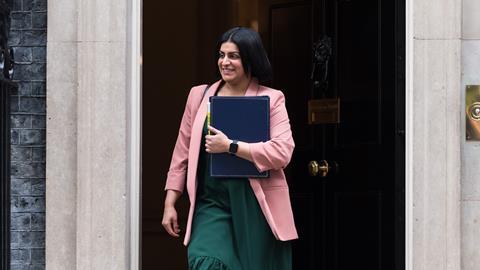Radical reforms to an asylum appeals system which 'sometimes seems designed to help frustrate a legitimate removal' were promised by the home secretary today. In a widely trailed announcement Shabana Mahmood told parliament that reform means 'tackling a thicket of laws that have achieved the same end, both international and domestic'.
In a statement on the government's asylum and reforms policy the home secretary set out plans to 'reduce the flow of arrivals into the UK. Second, how we increase the removal of those who have no legal right to be here'. Among the proposed changes is a reduction of the initial period of leave to remain for refugees from five years to 30 months. This will be be renewed only if they are still considered in need of protection, the document states.
The document proposes to limit the application of Article 8 of the European Convention on Human Rights in three ways:
- Strengthening the public interest test. ‘Our view is that the balance between the individual’s Article 8 rights and the public interest needs to be fundamentally reset to place a much greater emphasis on complying with our immigration rules: non-compliance should not be rewarded,’ the document states.
- Defining family more tightly. ‘Family, for the purposes of Article 8, should not normally go beyond immediate family members; unless, for example, other family members are acting in a parental capacity or there is a different, exceptionally close link.’
- Placing new limits on Article 8 applications. ‘For individuals who want to join a family member in the UK, where they do not meet the requirements of the family immigration rules, an application will have to be made by their UK-based family member. This is designed to prevent the creeping extension of Article 8 rights to those living overseas.’
On the appeals process, the government proposes creating a new appeals body 'staffed by professionally trained adjudicators, with safeguards to ensure high standards'. The document states that 'Early legal advice will be a core part of system reforms, avoiding delays and late claims, leading to better decisions.'
Commenting on the announcement, the Law Society said that the right to a fair hearing must be maintained. 'Unfair treatment in our justice system harms us all,' said Society president Mark Evans. 'Asylum reforms should focus on the Home Office getting decisions right first time, not moving the goal posts but acting fairly to support our collective good. The right to a fair hearing is not optional; it is central to our justice system, especially for people fleeing danger or persecution,' he said.
Evans also said the reforms must respect international agreements such as the Refugee Convention and European Convention on Human Rights. 'As reforms take place it is vital that they are tested against these core principles with proper accountability and transparency.'
This article is now closed for comment.




























13 Readers' comments